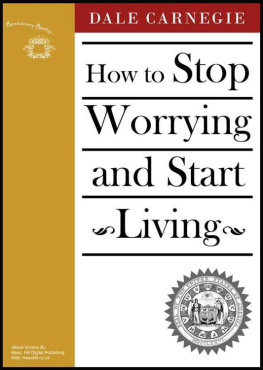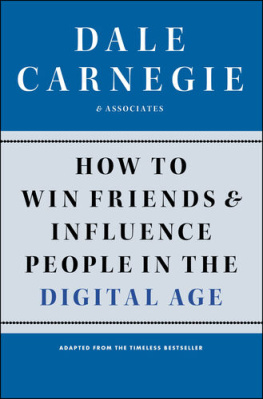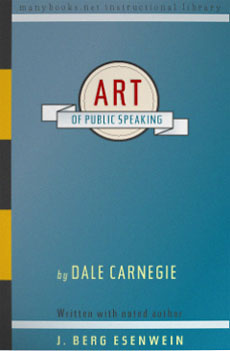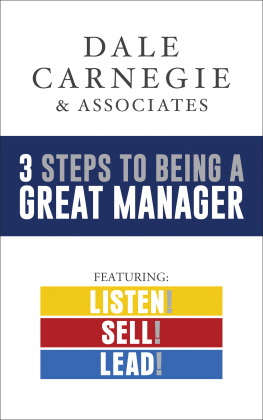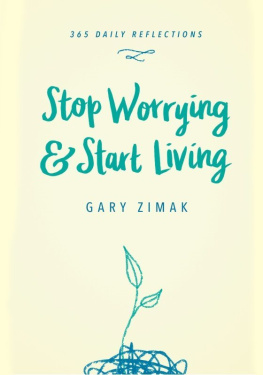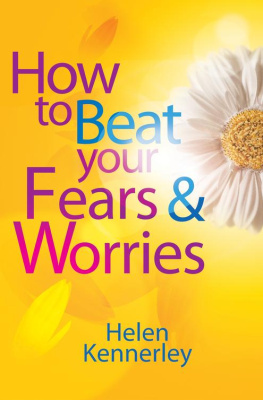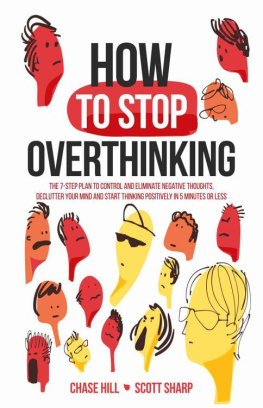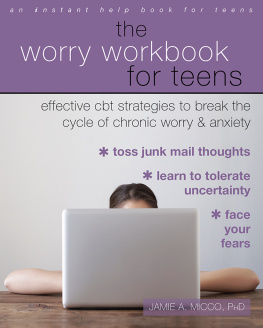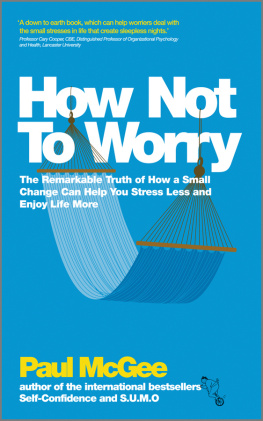Contents:
Preface
(Part One) Fundamental Facts You Should
Know About Worrying
(Part Two) Basic Techniques in Analyzing Worry
(Part Three) How to Break the Worry
Habit Before It Breaks You
(Part Four) Seven Ways to Cultivate a Mental Attitude
That Will Bring You Peace and Happiness
(Part Five) The Golden Rule for Conquering Worry
(Part Six) How to Keep from Worrying About Criticism
(Part Seven) Six Ways to Prevent Fatigue and Worry
and Keep Your Energy and Spirits High
(Part Eight) How to Find the Kind of Work In
Which You May Be Happy and Successful
(Part Nine) How to Lessen Your Financial Worries
(Part Ten) How I Conquered Worry 32 True Stories
Copyright Information
Preface
Sixteen Ways in Which
This Book Will Help You
1. Gives you a number of practical, tested formulas for solving worry situations.
2. Shows you how to eliminate fifty percent of your business worries immediately.
3. Brings you seven ways to cultivate a mental attitude that will bring you peace and happiness.
4. Shows you how to lessen financial worries.
5. Explains a law that will outlaw many of your worries.
6. Tells you how to turn criticism to your advantage.
7. Shows how the housewife can avoid fatigue and keep looking young.
8. Gives four working habits that will help prevent fatigue and worry.
9. Tells you how to add one hour a day to your working life.
10. Shows you how to avoid emotional upsets.
11. Gives you the stories of scores of everyday men and women, who tell you in their own words how they stopped worrying and started living.
12. Gives you Alfred Adler's prescription for curing melancholia in fourteen days.
13. Gives you the 21 words that enabled the world-famous physician, Sir William Osier, to banish worry.
14. Explains the three magic steps that Willis H. Carrier, founder of the air-conditioning industry, uses to conquer worry.
15. Shows you how to use what William James called "the sovereign cure for worry".
16. Gives you details of how many famous men conquered worry. Men like Arthur Hays Sulzberger, publisher of the New York Times; Herbert E. Hawkes, former Dean of Columbia University; Ordway Tead , Chairman of the Board of Higher Education, New York City; Jack Dempsey; Connie Mack; Roger W. Babson; Admiral Byrd; Henry Ford; Gene Autry; J.C. Penney and John D. Rockefeller.
Preface
How This Book Was
Written and Why
Thirty-Five years ago, I was one of the unhappiest lads in New York. I was selling motor-trucks for a living. I didn't know what made a motor-truck run. That wasn't all: I didn't want to know. I despised my job. I despised living in a cheap furnished room on West Fifty-Sixth Street a room infested with cockroaches. I still remember that I had a bunch of neckties hanging on the walls; and when I reached out of a morning to get a fresh necktie, the cockroaches scattered in all directions. I despised having to eat in cheap, dirty restaurants that were also probably infested with cockroaches.
I came home to my lonely room each night with a sick headache a headache bred and fed by disappointment, worry, bitterness, and rebellion. I was rebelling because the dreams I had nourished back in my college days had turned into nightmares. Was this life? Was this the vital adventure to which I had looked forward so eagerly? Was this all life would ever mean to me working at a job I despised, living with cockroaches, eating vile food and with no hope for the future? I longed for leisure to read, and to write the books I had dreamed of writing back in my college days.
I knew I had everything to gain and nothing to lose by giving up the job I despised. I wasn't interested in making a lot of money, but I was interested in making a lot of living. In short, I had come to the Rubicon to that moment of decision which faces most young people when they start out in life. So I made my decision and that decision completely altered my future. It has made the last thirty-five years happy and rewarding beyond my most Utopian aspirations.
My decision was this: I would give up the work I loathed; and, since I had spent four years studying in the State Teachers' College at Warrensburg, Missouri, preparing to teach, I would make my living teaching adult classes in night schools. Then I would have my days free to read books, prepare lectures, write novels and short stories. I wanted "to live to write and write to live".
What subject should I teach to adults at night? As I looked back and evaluated my own college training, I saw that the training and experience I had had in public speaking had been of more practical value to me in business and in life than everything else I had studied in college all put together. Why? Because it had wiped out my timidity and lack of confidence and given me the courage and assurance to deal with people. It had also made clear that leadership usually gravitates to the man who can get up and say what he thinks.
I applied for a position teaching public speaking in the night extension courses both at Columbia University and New York University, but these universities decided they could struggle along somehow without my help.
I was disappointed then but I now thank God that they did turn me down, because I started teaching in Y.M.C.A. night schools, where I had to show concrete results and show them quickly. What a challenge that was! These adults didn't come to my classes because they wanted college credits or social prestige. They came for one reason only: they wanted to solve their problems. They wanted to be able to stand up on their own feet and say a few words at a business meeting without fainting from fright. Salesmen wanted to be able to call on a tough customer without having to walk around the block three times to get up courage. They wanted to develop poise and self-confidence. They wanted to get ahead in business. They wanted to have more money for their families. And since they were paying their tuition on an installment basis and they stopped paying if they didn't get results and since I was being paid, not a salary, but a percentage of the profits, I had to be practical if I wanted to eat.
I felt at the time that I was teaching under a handicap, but I realize now that I was getting priceless training. I had to motivate my students. I had to help them solve their problems. I had to make each session so inspiring that they wanted to continue coming.
It was exciting work. I loved it. I was astounded at how quickly these business men developed self-confidence and how quickly many of them secured promotions and increased pay. The classes were succeeding far beyond my most optimistic hopes. Within three seasons, the Y.M.C.A.s, which had refused to pay me five dollars a night in salary, were paying me thirty dollars a night on a percentage basis. At first, I taught only public speaking, but, as the years went by, I saw that these adults also needed the ability to win friends and influence people. Since I couldn't find an adequate textbook on human relations, I wrote one myself. It was written no, it wasn't written in the usual way. It grew and evolved out of the experiences of the adults in these classes. I called it How to Win Friends and Influence People.
Since it was written solely as a textbook for my own adult classes, and since I had written four other books that no one had ever heard of, I never dreamed that it would have a large sale: I am probably one of the most astonished authors now living.
As the years went by, I realized that another one of the biggest problems of these adults was worry. A large majority of my students were business men executives, salesmen, engineers, accountants: a cross section of all the trades and professions and most of them had problems! There were women in the classes business women and housewives. They, too, had problems! Clearly, what I needed was a textbook on how to conquer worry so again I tried to find one. I went to New York's great public library at Fifth Avenue and Forty-second Street and discovered to my astonishment that this library had only twenty-two books listed under the title WORRY. I also noticed, to my amusement, that it had one hundred and eighty-nine books listed under WORMS. Almost nine times as many books about worms as about worry! Astounding, isn't it? Since worry is one of the biggest problems facing mankind, you would think, wouldn't you, that every high school and college in the land would give a course on "How to Stop Worrying"?
Next page
